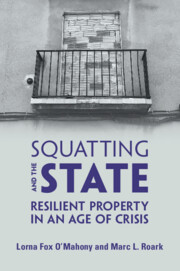Book contents
- Squatting and the State
- Squatting and the State
- Copyright page
- Dedication
- Contents
- Preface and Acknowledgments
- Introduction Squatting, Scale, and the State
- Part I Squatting and the State
- 1 States, Narratives, and Norms
- 2 Squatting and the Law
- 3 Property Theory and the State
- 4 Scaling the State
- Part II Resilient Property in an Age of Crises
- Part III Resilient Property in Action
- Bibliography
- Index
3 - Property Theory and the State
from Part I - Squatting and the State
Published online by Cambridge University Press: 11 August 2022
- Squatting and the State
- Squatting and the State
- Copyright page
- Dedication
- Contents
- Preface and Acknowledgments
- Introduction Squatting, Scale, and the State
- Part I Squatting and the State
- 1 States, Narratives, and Norms
- 2 Squatting and the Law
- 3 Property Theory and the State
- 4 Scaling the State
- Part II Resilient Property in an Age of Crises
- Part III Resilient Property in Action
- Bibliography
- Index
Summary
While the institution of private property is a central institution of the liberal state, the role of the state is necessarily, and paradoxically, de-centered in accounts of liberal property law. The rhetorical power of ownership relies on the de-politicization of property rights, positioning the question of entitlements and the protection of the status quo of private property above, or prior to, the law. In periods of relative stability the relationships between private property, political ideologies, state legitimacy and authority are relegated from the “public realm” of political and legal debate to the “private sphere” of interpersonal relations between individuals. Indeed, the resilience of the liberal state is rooted in the taken-for-granted assumption that private property rights (as defined by the dominant narrative) will, and must, be upheld. However, in an age of crisis, “settled” liberal nation states, including the USA and the UK, economic setbacks, social movement protests, and civil unrest, have called into question the relationships between property relations, on the one hand, and the authority and legitimacy of state actions and institutions, on the other. This chapter explains how “Resilient Property” approach and methodology focuses directly on state action in responding to property problems, particularly in moments of crisis.
Keywords
- Type
- Chapter
- Information
- Squatting and the StateResilient Property in an Age of Crisis, pp. 143 - 164Publisher: Cambridge University PressPrint publication year: 2022

